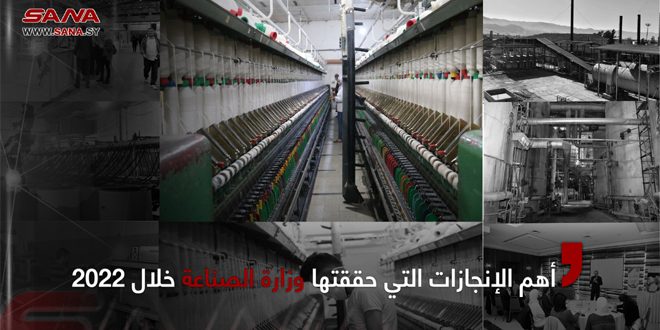Damascus (ST): Despite the difficulties faced by the Syrian industries as a result of being affected by the unilateral coercive economic measures imposed on the Syrian people, the Ministry of Industry was able to achieve a number of achievements during the year 2022 in terms of developing work according to specific programs and plans and according to the available resources and capabilities. In addition, the ministry was keen on rehabilitating a number of companies and production factories with the expertise of national cadres, opening new production lines, supporting medium enterprises and productive factories.
The most prominent achievements come as follows:
– Rehabilitation of the Tal Salhab Sugar Company after it was suspended for more than 7 years with an estimated cost of 5 billion Syrian pounds, and the purchase of the entire sugar beet crop from farmers with a total amount of 59 thousand tons for the 2021-2022 season with an estimated value of 15 billion pounds.
-Rehabilitation of the yeast factory in the Homs Sugar Company at an estimated cost of $1 million in cooperation with the United Nations Industrial Modernization Program “UNIDO”.
– Rehabilitation of the Mediterranean line in the Aleppo Cables Company, at a final estimated cost of 16 billion pounds, as a large proportion of the equipment was supplied in the current year, and work is underway to complete the rest during the next year.
-Rehabilitation of the “Zenobia and Shamra” company and its entry into production at an estimated cost of 400 million pounds, and it was approved as a company producing labor clothing.
Rehabilitation of 4 recycling machines that were in the Al-Khumasia Company in Damascus and operating them within the General Company for Cotton Yarns in Hama, at a cost of 850 million pounds.
Implementation of a number of development projects and training courses:
-Starting the implementation of the digital transformation project for the industrial registry and networking between all the agencies affiliated with the Ministry of Industry, at a cost of 700 million pounds.
-Granting the Management and Productivity Development Center in the Ministry of Industry a license to train and qualify companies in the public and private sectors to obtain the international conformity certificate “ISO”. These companies include “Damascus Cables” at a cost of 16 million pounds, and “Tamico” for the pharmaceutical industry at a cost of 90 million pounds.
– Holding courses in cooperation with the United Nations Development Program “UNDP” to qualify and train the workers of “Wasim” and “Al Sharq” companies to design models using the latest programs specialized in fashion design.
-The establishment of many training courses for free in technical institutes, complexes and training centers and in the Management and Productivity Development Center, and the formation of special committees to study the approved curricula.
-Opening a vocational training center and another for training and employment in Adra Industrial City to train cadres in the administrative and technical fields and rehabilitate them to enter the labor market in industrial establishments in the public and private sectors.
-Implementation of specialized courses in the traditional glass khan in Damascus to preserve these crafts and their heritage identity, and increase the number of craftsmen working in them.
-Opening two production units of “Wasim” company for ready-made clothes in the governorates of Lattakia and Tartous to attract labor from the families of the martyrs, and increase the production capacities of the company at an estimated cost of 600 million pounds.
-Operating a new production line within Dreikeesh water bottling unit, measuring 0.5 liters, at a cost of 475 million pounds.
– Launching the production of the screen manufacturing line in the Syrian Arab Company for Electronic Industries “Seronix” after it stopped due to economic sanctions, at a cost of 1.5 billion pounds, to manufacture 1400 screens measuring 32 and 55 inches, with good technical specifications and advanced technology, as the first product with these specifications to be present in the Syrian market.
-Distribution of additional net profits for the year 2021 related to a number of institutions and companies in the public sector to their employees according to work centers and by adopting marks for each center.
– Coordinating with the Ministry of Economy and Foreign Trade to frame the classification of small, medium and micro companies in order to support small projects, traditional crafts and productive families in order to achieve an increase in income and improve the social reality.
K.Q.

